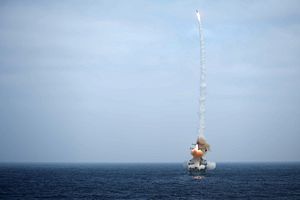As Washington starts to counter Beijing on multiple fronts — economically, politically and militarily — the Trump administration’s free and open Indo-Pacific (FOIP) strategy is quickly gaining more definition. The United States has struggled to define its FOIP, a regional construct also led by Australia, India, and Japan, ever since Trump signed on to the concept last November at the Asia-Pacific Economic Cooperation (APEC) CEO Summit held in Da Nang.
In recent days, however, U.S. officials, including Vice President Mike Pence, have started to comment publicly on details of the strategy. Another U.S. official, U.S. Assistant Secretary of Defense for Asian and Pacific Security Affairs Randall G. Schriver, recently visited Vietnam to speak on what the U.S. FOIP means for Hanoi. Schriver was making his third visit to Vietnam as part of the annual Defense Policy Dialogue between the United States and Vietnam’s Ministry of National Defense, amid growing military ties between the two former combatants.
In his speech at the American Center in Ho Chi Minh City on October 5, Schriver began by referring to the Indo-Pacific region as a “priority theater,” while highlighting some of the more aggressive actions undertaken by China in the region, particularly in the South China Sea (which Vietnam refers to as the East Sea). Schriver defined the new U.S. National Defense Strategy as based upon three pillars: 1) recognition of great power competition, primarily between China, Russia, and the United States; 2) the development and nurturing of defense allies and partners; and 3) structural reforms of the U.S. Defense Department to better undertake its mission.
How Vietnam Benefits From the New U.S. Strategy
One of the ways in which Vietnam can gain from the FOIP strategy is through freedom of navigation operations (FONOPs) conducted by major players in the region. These FONOPs are intended to show Beijing and the other littoral nations of the South China Sea that passage by naval vessels can be free and open — despite Beijing’s claim to some 90 percent of the waters and its determination to control rights to passage.
Schriver spoke at some length concerning one such recent U.S. FONOP involving the near collision between the USS Decatur, an Arleigh Burke-class destroyer, and the Lanzhou, a Luyang-II class guided-missile destroyer, near the Gaven Reef in the disputed Spratly Islands (also claimed by Vietnam). During the FONOP, the Chinese destroyer reportedly passed within some 45 yards (40 meters) of the U.S. destroyer, causing the U.S. warship to alter its course in order to avoid a collision. This year, the U.S. has conducted four FONOPs in the South China Sea so far, compared to four in 2017, three in 2016, and one in 2015.
According to Schriver, the U.S. FONOPs are in response to the construction of artificial islands by Beijing — built around reefs and rocks to create “facts on the ground” in an effort to further China’s claims. Some of those rocks and reefs claimed by China (such as Gaven Reef) used to be submerged during high tide. Schriver suggested further action may be taken by the Trump administration against Chinese companies involved in the construction of these artificial islands — presumably through the implementation of economic sanctions.
In the airspace over the disputed waters, Schriver mentioned the FOIP policy would also resist any existing or new declarations by Beijing of Air Defense Identification Zones (ADIZ), one of the ways in which China attempts to assert its sovereignty in the region. Schriver stated that under a free and open Indo-Pacific “the United States will fly, sail, and operate wherever international law allows,” consistent with the previous policy of former Secretary of Defense Ash Carter under the Obama administration “pivot to Asia,” and revealing implicit support for the territorial claims of littoral states such as Vietnam.
With a Little Help From My Friends
While the new U.S. National Defense Strategy calls for the development and nurturing of defense partners such as Vietnam, Hanoi will not get too friendly thanks to its foreign policy of “Three Nos”: no foreign bases on its territory, no military alliances, and no involving third parties in its disputes.
While Hanoi does not officially involve third parties in its dispute over the South China Sea, Vietnam will stand to gain from an increase in FONOPs and other challenges to Beijing’s assertion of authority under the U.S. administration’s free and open Indo-Pacific strategy. Some of the naval vessels conducting FONOPs will continue to make port of call visits at Cam Ranh Bay, furthering the development and nurturing of defense partnerships between Hanoi, the United States, and other major naval players in the region, while their FONOPs will show implicit support for the claims of Vietnam and other littoral nations.
Finally, with the potential for greater cooperation among the great naval powers in the region to promote and administer a free and open Indo-Pacific strategy, in an era of greater economic, military, and political competition among China, Russia, and the United States, Hanoi may find it easier than ever to skillfully play all three partners off against each other to maximum advantage.
Gary Sands is a Senior Analyst at Wikistrat, a crowdsourced consultancy, and a Director at Highway West Capital Advisors, a venture capital, project finance and political risk advisory. A former diplomat with the U.S. Overseas Private Investment Corporation, he has contributed a number of op-eds for Forbes, U.S. News and World Report, Newsweek, Washington Times, The Diplomat, Asia Times, National Interest, EurasiaNet, and the South China Morning Post. He is currently based in Taipei.

































